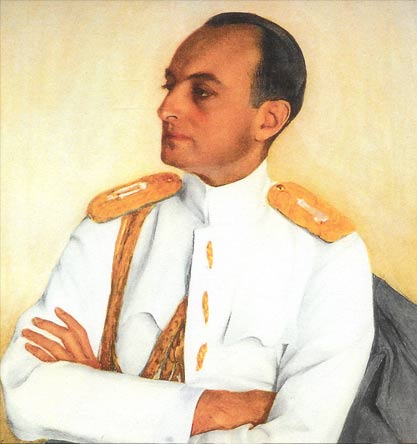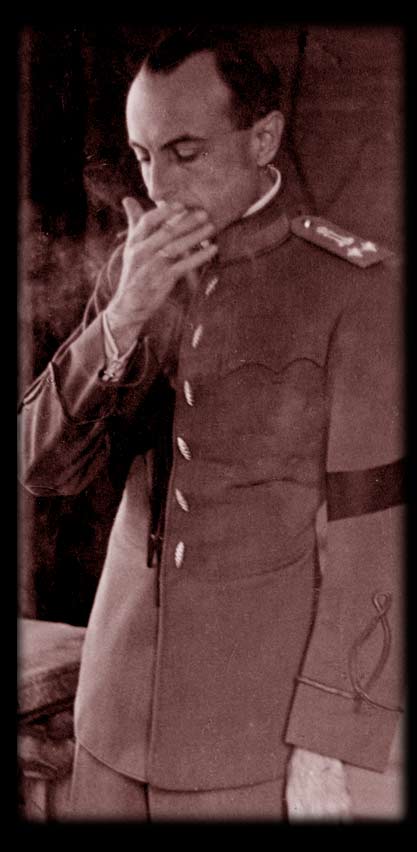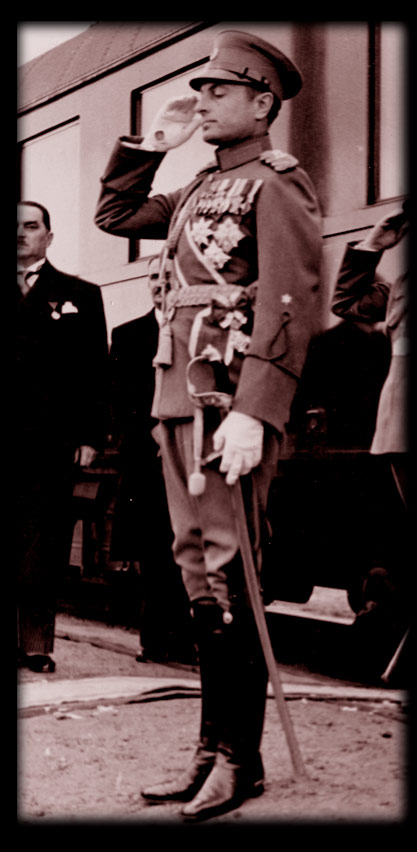HISTORY:
His Royal Highness, Prince Paul of Yugoslavia was a man of great
courage and conviction who, as head of state, was able to stand up to and
say “No” to both Winston Churchill and Adolf Hitler. For this act of defiance
he was labeled a traitor and a Nazi collaborator and his name and legacy
were wrongly vilified - until now. After almost 70 years following his forced
abdication and exile, his daughter, H.R.H Princess Elizabeth of Yugoslavia,
obtained and published information from the Special Operations Executive files
(an arm of the British Secret Service) in the Foreign Office in London. These
highly classified documents corroborate Prince Paul’s innocence and provide
the additional evidence needed to clear his name. Serbia is currently in the
process of vindicating him through a process called restitution. He is finally being
acknowledged for the visionary, peacemaker and hero that he was: A man who
refused to sacrifice his nation in order to placate the ruthless needs of larger,
more powerful nations.
Prince Paul was born in St. Petersburg, Russia, on April 15, 1893, the
only son of Prince Arsen Karageorgevic (brother of King Peter I of Serbia)
and Princess Aurore Demidov. He grew up in Geneva, Switzerland, a virtual
orphan, abandoned by his father who was more interested in military campaigns
and only seeing his mother twice in his life. He was an intimate friend of King
George VI and Queen Elizabeth, a trusted and much loved brother-in-law of
the Duke of Kent (brother of King George) who was married to his wife’s sister
Princess Marina. In 1923, with the Duke of York (the future King George VI) at his side as his best man, he
married H.R.H Princess Olga of Greece and Denmark. She was the daughter
of Grand Duchess Helen Vladimirovna Romanov and granddaughter of Tzar
Alexander II of Russia. (great-great-great grandson of Catherine the Great)
Olga’s first cousin, Prince Philip of Greece and Denmark later became the
Duke of Edinburgh when he married the current Queen of England. In 1939,
King George awarded Paul the Knight of the Garter, the pinnacle of the honors
system in the United Kingdom and a means of rewarding an individuals’ personal
bravery, achievement, and service. Paul was educated at Oxford University and
maintained close ties with the British royal family until his death.
Prince Paul ascended to the Regency on October 9, 1934, when his
cousin King Alexander of Yugoslavia was brutally assassinated in Marseilles,
France, leaving his young son and heir, eleven-year old Peter under Paul’s
protection. Paul inherited a country suffering from a volatile infrastructure,
tenuously held together under the King’s autocracy. Paul did not agree with the
use of force and intimidation, instead, throughout his leadership, he fought hard
to establish the first constitutional democratic government. Fueled by a vision for
a unified Yugoslavia, he did what no other ruler had achieved and succeeded
in bringing together Serbs, Croats and Slovenes. During the 7 years he served
as Regent, Paul was placed in the unfortunate position of assuming control of a
nation during the most treacherous period of modern history. He skillfully juggled
both the harrowing internal and external politics of the time while attempting to
secure economic stability without jeopardizing his political alliances. This he was
able to do until his alliances demanded the ultimate sacrifice – the betrayal of his
national loyalties. Up until the war, Germany accounted for 50% of Yugoslavia’s
export and trade. Paul repeatedly traveled to England and asked Anthony Eden
to increase their meager 9% trade to make them less dependant on Germany.
The British government agreed that this would be prudent, but never did anything
to help. They did purchase 200 turkeys in 1939 though. Maybe their hands were
tied, but their lack of support left a country, already impoverished as a result of
trade embargoes against Italy, severely compromised.
In 1940, an evil axis was looming in Europe and the threat of war was imminent.
With virtually no army to defend themselves and few armaments at their
disposal, Yugoslavia had to depend on her leaders’ careful strategy to avoid
sure annihilation. Paul took his role as regent very seriously. He was obligated
to deliver the Kingdom of Yugoslavia to Peter, when he came of age, in the
same condition that it had been entrusted to him. He didn’t believe that it was
his right to lead lambs to slaughter and to sacrifice an entire nation simply as
a decoy to protect the safety of others. No matter his personal alliances, the
safety and protection of his country had to come first. Herein lay his downfall.
He continued to reach out to the Allies, believing that his friends wouldn’t let
him down, and asked for military reinforcements and support. He knew that
his small country was ill-prepared and ill-equipped for any confrontation or
conflict with Germany and or Italy. He wisely did what he could, given his limited
resources, to fortify his borders, as Yugoslavia’s geographical position placed it
in a precarious situation. It was completely surrounded by hostile or openly pro-
German nations. All the other Balkan countries had capitulated and had already
signed treaties with Hitler. But as much as Paul asked Britain, France and the
United States for help, and as much as they promised, they never followed
through. His duty as head of State, was to negotiate with all foreign governments,
even the two he most feared and abhorred, Mussolini’s and Hitler’s. Early on, he
recognized Hitler as the epitome of evil and despised everything that he stood
for.
Paul was dealing with yet another dilemma, one that was overlooked by the
Allies; he knew that if he declared war, it would be very difficult to convince Serbs
and Croats to fight together against the Germans, especially as many Croatian
separatists, under The Ustase, were fascists and pro-Nazi. (They did, indeed, as
Paul foresaw, end up fighting with the Nazis until the end of the war) The Allies,
with little understanding of the politics of Yugoslavia, had the impression that the
fierce and legendary Serbian warriors would rise to the occasion - If it had only
been so simple.
In 1941, Churchill suddenly decided that mere Yugoslav neutrality was not
enough. The British were going to send a mechanized force to Greece and
proposed to form a united Balkan front. Prince Paul was horrified. He considered
the plan impetuous and doomed to failure. The landing of British troops in
Greece would provoke Hitler into a Balkan offensive. Basically Britain was
calling for a Yugoslav act of suicide, which London referred to as a “side show
in a Mediterranean theater of war”. He demanded that Paul declare war on
Germany. When he protested, Churchill’s response was “Prince Paul’s attitude
looks like that of an unfortunate man in a cage with a tiger, hoping not to provoke
him, while steadily dinnertime approaches.” As a consequence of the appalling
responsibilities and exigencies of war, Churchill was driven to the conclusion that
it was the right and even the duty of great powers to sacrifice smaller neutrals
for the sake of victory over Nazism, and wanted them to do just that. That’s
understandable except it you happen to be that smaller neutral! In spite of feeling
pressure from all sides, Prince Paul put his foot down and said, “No.” In doing so,
he signed his death warrant.
As a last resort, Paul traveled to Berchtesgaden to meet secretly with Hitler.
On
4th
March, 1941, in a 5-hour meeting with only Von Ribbentrop present, he
withstood the onslaught of the Fuhrer’s demands that he sign the Tripartite Pact.
Because of new evidence, the truth of that meeting is finally being revealed. Paul
held his ground and told Hitler that the terms of the deal were unacceptable. He
ended up convincing Hitler to agree to a treaty honoring Yugoslav sovereignty
without allowing German troops to travel through the country or for them to build
any bases. This was a huge victory for Paul.
On March 27th, in the final act of betrayal, the British sanctioned and funded a
coup d’etat in Belgrade, which overthrew the Regency. Paul never knew this but
the British Secret service had been behind the scenes inciting a small group of disgruntled Serbs in the military who were greedy for power. Churchill was hell-bent on Yugoslavia entering the war and had
decided that no one should stand in his way. Even a man like Paul, who had trusted the British so completely that he had refused to put wire taps in British embassy. Paul was arrested and brought to the war office and
given an ultimatum: Abdicate immediately or he and his whole family would be
shot. He was accused of being a traitor and of having sold out his country to the
Nazis. If anyone had bothered to read the front page of the newspaper Politika,
they would have seen that the terms of the treaty were clearly outlined and that
there was no alliance with the Nazis. It was obviously an excuse to get rid of him.
He was escorted back to the White Palace and was given 4 hours to leave the
country.
The British hailed the coup as a great victory and while Paul was on the
phone with the British Ambassador, asking him for British asylum, the Embassy
was celebrating his demise with champagne. Churchill issued a statement
that “Yugoslavia had finally found its soul.” So, with clear consciences, they
sentenced to death one and a half million Serbs. The propaganda machine
perpetuated the myth that King Peter had orchestrated the revolution and had
escaped from the Palace down a drainpipe. They even went so far as to
impersonate the King during a public announcement on the radio. The true story
was that Peter was still in the Palace with Paul and the rest of the family, crying
and hugging as they prepared to leave him behind. The new government
immediately tried to establish ties with the Germans to insure that they would
uphold the very same treaty that Paul had secured. But Hitler had run out of
patience and declared war on Yugoslavia. He launched “Operation Punishment”
and as Paul had predicted, destroyed the country in 6 days.
Prince Paul and his family headed to Greece and from there, they were sent
to Egypt and then on to Kenya were they were subjected to great indignity,
under British house arrest for 3 years. Then, they moved to South Africa, at
the invitation of General Smuts where they remained until the end of the war.
Paul suffered greatly, and perhaps never fully recovered from the humiliating
treatment he received. He was even accused of war crimes and supposed
to stand trial at Nuremburg. Many years later, Churchill admitted that his
treatment of Paul had been particularly harsh and unfair. But, sadly, awful
rumors and accusations perpetuated to his death on September 14, 1976.
|

Painting of His Royal Highness Prince Paul of Yugoslavia


|

